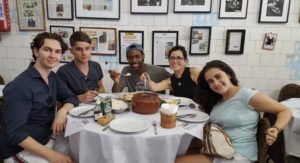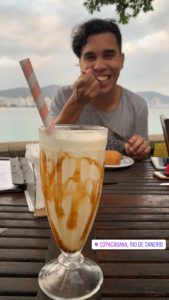I still cannot believe that my time in Rio de Janeiro has come to an end.
I’ve learned so much not just about Portuguese, but also how to learn a language. I’ve always approached language learning very academically, doing conjugation charts over and over again and learning the rules for every written sentence structure and way of speaking. In Brazil, I was more so thrust into an environment and forced to speak. This brought about a lot of failure—a lot more than I thought necessary in the beginning. But through my time, I am now confident in my abilities to not just fail, but to fail quickly and fail forward. Now whenever I make a mistake, I remember it, learn from it, grow, and move on to the next one. This helped me reach my language acquisition goals. Everyone I talked to in Brazil was extremely surprised at how well I spoke Portuguese (especially as someone from the United States!)
A piece of my heart will always be in Brazil, and I will definitely be spreading the wonderful Brazilian love I received back here in the States. I’ve already told my friends to call me “Samuca” instead of Samuel, and that we’re no longer throwing parties, but “festas.” I’m sure I will be listening to Brazilian funk for the rest of my life. I have already recommended the SLA grant to some of my friends, and the first thing I told them to do was to just go for it and make sure to find a good program. I did not realize how wonderful the Rio & Learn program would be. I could not have imagined my time being as great in Brazil with any other program.
I recently just gotten back on campus and have already met a first-year student who is from northeast Brazil (Bahia). I will continue to interact with native Brazilian Portuguese speakers in order to keep up with my language skills. My time and language acquisition in Brazil will help me in two major ways. The first is with singing. Learning Portuguese has enabled me to access different parts of my voice, using sounds that I didn’t even know I could make. This strengthens my voice as an actor and opera singer by giving me more control over my voice, and consequently more control over the range of emotions I am able to display. This will be especially important as I begin to apply to MFA acting programs in the upcoming months. Secondly, I am taking a Fundamental of Linguistic Anthropology course this semester, and will use what I learned in Brazil to help analyze and form arguments both in and outside the course.




